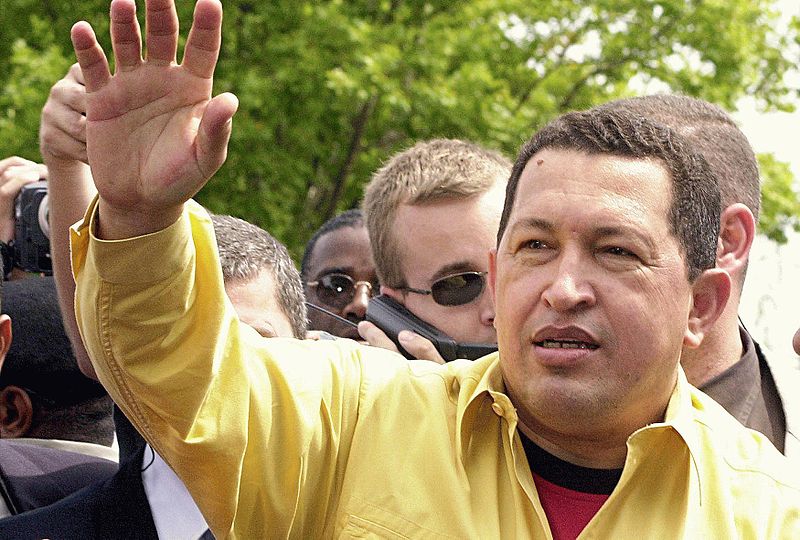This Sunday, Chavez vs. Opposition – Round Four
 The other day, President Obama was “fortunate” enough to receive an unexpected backing: "I hope this doesn't harm Obama, but if I was from the United States, I'd vote for Obama," said Hugo Chavez, the president of Venezuela and staunch anti-American. Though this was an endorsement Obama would have loved to avoid (and accusations from the Republican camps immediately appeared) it was certainly very good politics for Mr. Chavez, especially in the face of his own upcoming election this Sunday. Indeed, in face of rising opposition against his 12-year reign, Chavez’s move to endorse Obama, and to go as far to call him “a good guy” whom he would vote for is a logical backing of the least interventionist of the two major-ticket candidates. Promoting a “weak” and “non-interventionist” American candidate is therefore a way for Chavez to galvanize his own support base.
The other day, President Obama was “fortunate” enough to receive an unexpected backing: "I hope this doesn't harm Obama, but if I was from the United States, I'd vote for Obama," said Hugo Chavez, the president of Venezuela and staunch anti-American. Though this was an endorsement Obama would have loved to avoid (and accusations from the Republican camps immediately appeared) it was certainly very good politics for Mr. Chavez, especially in the face of his own upcoming election this Sunday. Indeed, in face of rising opposition against his 12-year reign, Chavez’s move to endorse Obama, and to go as far to call him “a good guy” whom he would vote for is a logical backing of the least interventionist of the two major-ticket candidates. Promoting a “weak” and “non-interventionist” American candidate is therefore a way for Chavez to galvanize his own support base.
Indeed, Sunday’s election may very well not be as easy as that of 2007, when Mr. Chavez beat his challenger, Manuel Rosales, with 63 percent of the votes. Though most opinion polls give Mr. Chavez a clear lead, there have been suggestions that these are not to be trusted. His opponent, the youthful and energetic Henrique Capriles is a strong contender and has made important pledges like helping Colombian peace talks with the FARC. Capriles went as far as to call Venezuela “an accomplice of the guerrillas” and met with President Juan Manuel Santos of Colombia. Capriles also wants to distance himself from Iran and others of Chavez’s “allies.” He even promised to stop buying expensive weaponry from Russia and boldly asked "What do we have in common with Iran apart from producing oil?" All of Venezuela's opposition is united behind Capriles, with almost 3 million people mobilizing to vote for him in the opposition primary in February.
Can Mr. Capriles beat Hugo Chavez? And, if so, would Mr. Chavez relinquish power? On the latter concern, the army has pledged to remain neutral, though Hugo Chavez has promised “chaos” should he lose. This election will therefore be a true test of Venezuela’s democracy and, for that matter, of the army’s loyalty. Though the army is constitutionally neutral, its main ranks have been filled with Chavez loyalists and there is doubt whether they would stay motionless in face of a Capriles victory. Analysts see Chavez as more vulnerable than ever, but Capriles faces in Mr. Chavez’s person a formidable campaigner who is finally in good health after recovering from his cancer operations. The very fact that Chavez might be able to campaign this vigorously, and in fact to stand in the election at all was doubted a few months ago. Moreover, Chavez has on his side the whole state apparatus, extensive patronage, and perhaps even more illegal means to sway voters. The Economist reports that the government requires of its 2 million public employees that they fill forms saying where they will vote, and there have been grave concerns that the government will monitor their votes. Still, growing concern over rising crime and corruption, and even concerns over Chavez’ capacity to fully recover from his illness, have put the opposition in a position to challenge Chavez’s regime very seriously for the first time.
So will “21st century socialism” falter? The answer will come this Sunday, and in case of victory, Chavez’ power for further reform will be almost endless. Whatever specialists predict, Chavez has his own message: “You will never rule Venezuela!"
